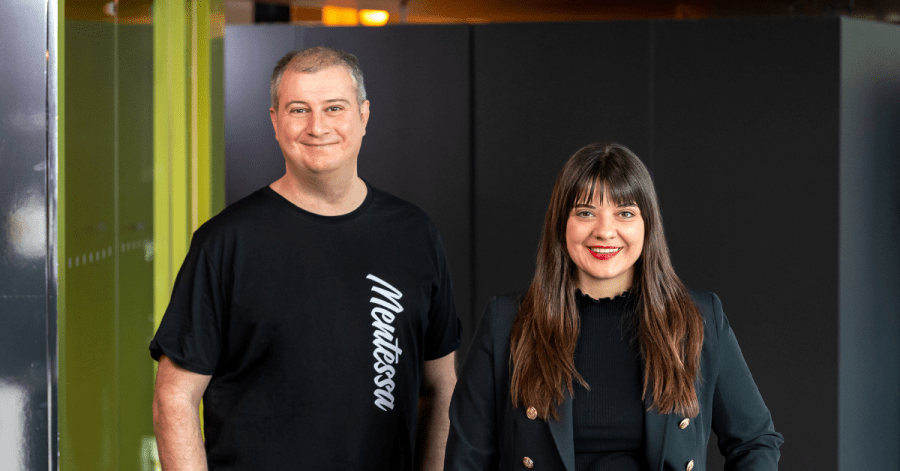Mentessa, the Munich-based AI platform for workplace collaboration, raised a €1M seed round led by Eleven Ventures to take on Slack. The round was also joined by some German and international angel investors. The company now plans to grow its team and build a Bulgarian product team with the goal to expand internationally.
Founded in 2019 by spouses Tina Ruseva and Andrey Andreev, Mentessa is a platform that connects organizations for learning and collaboration based on skills. The platform empowers people at work to find and share skills with their community, not only communicate with each other. The startup aims to differentiate from the widely-used tool for decentralized collaboration Slack and develop a new way of collaboration that is more inclusive and purpose-driven.
“The good old problem of integrating, onboarding people and building bonds internally has not been solved but rather has been exacerbated by COVID-19. Tina and Andrey are very experienced and highly knowledgeable co-founders who represent the “perfect match” – a successful serial entrepreneur with a deep and extensive understanding of the industry and a highly experienced tech professional with a background in some of the largest global organizations like Microsoft and Amazon. We are excited to be joining Mentessa, supporting Tina and Andrey on their journey of improving employee onboarding, integration, and engagement across organizations worldwide”, Valeri Petrov, Partner at Eleven Ventures, shares.
Targeted know-how exchange and AI matching
Mentessa is a white-label AI-based community platform for agile organizations that allows employees to match with peers for coaching, mentoring, or networking. The SaaS platform is fully customizable and matches the brand colors, logo, and specific processes in each organization that uses it. It is also hosted on the Cloud, securely and privately, and can be seamlessly integrated with the incumbent infrastructure or organizations.
By using AI, Mentessa allows organizations to automate the skills matching process for networking, peer learning, mentoring or even shadowing. Therefore, the main use cases of the web app are for implementing sustainable mentoring and onboarding programs for remote teams, as well as for identifying areas for upskilling and ensuring visibility, accountability, and exchange between all employees.
The platform is people-centric and its main goal is to empower employees to find the right peer at the right time, to learn from each other, and openly share experience.
The pain points in the collaboration industry
Ruseva shares that one of the main problems in the collaboration industry that she identifies today is that collaboration is organized around processes and checklists, while a lot more than that is expected. The Volatile, Uncertain, Complex, and Ambivalent (VUCA) times that we live in today require innovation which is the result of a lot of know-how exchange and people collaboration before the time comes for a process collaboration. That is why organizing these highly liquid structures for learning and decentralized work is a necessity in remote work.
The idea of online communities has been around since the internet. But alternatives are focused on formal knowledge on the basis of text, documents, and content. Mentessa is a platform that enables targeted, informal knowledge exchange between employees.
“Today you can book an apartment for 1 day or a car for 10 minutes. But people and their knowledge are still trapped in rigid department structures, roles, and job descriptions. In the platform economy, value is created in social networks. Mentessa manages to share skills in the organization as efficiently as you can find a driver on Uber. With that, we transform a workforce into a community, a community of skills where you can learn from anyone, work with anyone, anytime, and on anything,” Ruseva shares.
On a mission to maximize human potential
“I don’t get the boxes people are put in based on how they look, where they come from, or their job titles. As a woman in tech, a woman in research, an immigrant, and a young mother myself, I later found out that those labels put barriers on who we meet, how we develop, and how we collaborate with others in an organization. This is not just a diversity problem, but also a huge waste of innovation potential,” Ruseva shares.
From her experience in over 30 mentoring programs and 100+ communities, she has learned that rigid top-down initiatives are not enough to connect people in today’s environment. According to Ruseva, when it comes to maximizing human potential in the new world of work we have to rethink mentoring from a program towards an everyday resource of knowledge and collaboration. That is how the idea of a “Tinder for skills” was born.
Being a second-time founder, Ruseva exited her first company in 2013. She went back to the corporate world for 5 years only to realize how few people were collaborating in the office, especially beyond their job role, department, gender, generation, and origin. “This not only creates boundaries for learning and professional growth, but it also hinders innovation which is necessary at today’s speed and complexity of development,” she shares.
Ruseva founded Mentessa before she even had a team. She bootstrapped her way through customer discovery, product ideation, prototyping, and eventually team building. Her husband, Andrey Andreev, joined her in the role of the tech co-founder, and together they participated in the program of Founder Institute.
The future of Mentessa
After COVID-19 accelerated the need for effective remote work, Mentessa experienced rapid growth. In 2021, the company was endorsed by NASDAQ for supporting the SDG agenda and creating equal opportunities for everyone in the workplace.
For the short time it has been on the market, Mentessa has attracted customers such as Deutsche Telekom, Linde, or OTPbank. Currently, more than 5000 people use Mentessa’s white-label solution in their organizations and communities.
“We are now growing our team and plan to expand internationally. We have both studied in math high schools in Bulgaria and are well connected with the Bulgarian tech community. Building an engineering and product team in Bulgaria poses a great opportunity for Mentessa,” Ruseva concludes.







